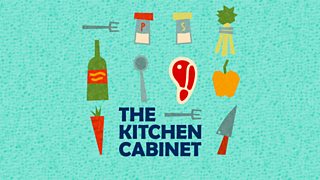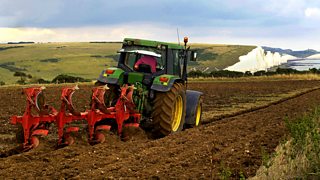1971: The year that changed food forever?
Fifty years ago, McDonald's launched the quarter pounder, new types of processed foods were hitting our shelves, a book full of vegetarian recipes, arguing that hunger could be eliminated from the world if we stopped eating meat, was a bestseller, and supermarkets were expanding across the country. The Food Programme’s Dan Saladino asks – was 1971 a turning point for how the world eats?
What did the world look like in 1971?
In the United States, it was a turbulent time. “Richard Nixon was President, Vietnam was raging, there was the hippy movement versus everyone else… Those tensions were in the background,” says Bon Appetit magazine’s Alex Beggs. There was also terrible inflation, which meant living costs were up, along with a demand for cheap food.
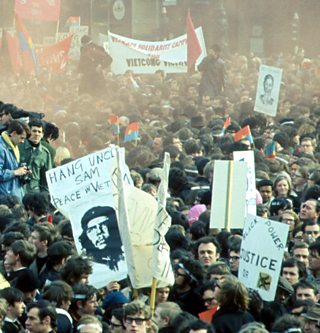
It was a period of extremes and huge social change, and food was also changing
Meanwhile, in the UK, unemployment and inflation were also on the rise but people were still experiencing the effects of the post-war boom. It was the first time that most Brits had carpets and televisions. It was a period of extremes and huge social change: The Equal Pay Act had just been introduced, roles around gender were shifting, and so was food…
Convenience food was making waves, but cooking for pleasure was also on the up
In 1971 there was a fork in the road for British culinary culture, argues food historian Polly Russell. “On the one hand there’s an increase in processed food, in supermarkets, in centralised food systems, in industrialised food, and all that goes with it. And on the other hand, there’s also a growth in an interest in cooking as a leisure activity, in the origins of food, in food and seasonality, in a much more engaged relationship with food.”
This split is illustrated by the publication of two important food books in 1971.
Delia Smith’s How to Cheat at Cooking was really aimed at women. It was helping the housewife to cook more easily, by using or adapting convenience and packaged foods. Recipes were centred around products like tinned lamb or baked beans.
But Jane Grigson's Good Things, published the same year, was about understanding food in terms of its history and its authenticity, and also about food and pleasure, says Polly. “I think this is a key moment, 1971, where we start thinking about food and cooking in terms of leisure as well as in terms of labour.”
Fast food was taking off…
In 1971 there were huge changes in the fast-food industry. McDonald's was expanding - not only its restaurants but also the amount of beef it was serving. In 1971, the quarter pounder was born. “This is when we were really starting to see American portion sizes start to go up and up,” says Bon Appetit magazine’s Alex Beggs.
In the same year, in Japan, instant ramen in a cup was born, and then launched in the US as Cup O’ Noodles. Perhaps the ultimate processed convenience food – eaten at home, work or on the go – these cup noodles took off, and would go on to transform eating habits all over the world. It wasn’t until 1977 that Golden Wonder finally caught up and launched Pot Noodle in the UK.

…And fast coffee landed
It was a year that big brands – that would go on to become international corporate giants – were springing up. One global phenomenon born in 1971 arrived fully caffeinated from Seattle: Starbucks.

Starbucks changed the way the world drinks coffee – and it all began in 1971
These days, a cup of Starbucks coffee might set us back a pretty penny, but fifty years ago the coffee was actually free. It was handed out as samples – used to help sell the coffee beans that were the company’s main product. A decade later Howard Schultz joined the business and, inspired by visits to espresso bars in Milan, came up with a model that took Starbucks into more than 80 countries, creating a brand with a market value of 90 billion dollars. Starbucks changed the way the world drinks coffee – and it all began in 1971.
In the US, free school meals were cooked up
In 2021 school food is a highly controversial and political issue. This was also the case in Oakland, California in 1971. There, The Black Panther Party realised that underprivileged children weren’t realising their true potential because they were arriving at school hungry. They introduced a free breakfast program – and suddenly the children it served were more focused and engaged. Today, over 30 million American kids are eligible for free or reduced school lunch in public schools and it was The Black Panthers, fifty years ago, who paved the way.
Awareness about global hunger was spread by a Beatle
There were other forms of direct action being pioneered at this time. The Concert for Bangladesh, organised by George Harrison, took place in the summer of ’71. Its aim: to fight famine in South Asia.
The concert for Bangladesh at Madison Square Garden combined music with the food crisis and was “really the very first mass media, celebrity-led appeal to food public consciousness,” says Professor Tim Lang, a professor of food policy. “It put hunger on the map in the way that the creation of Oxfam had begun to do in the previous decade.”
“That concert was a game changer,” he says. We still have gross inequality in the world but Marcus Rashford and his free school meals campaign is a great example of how modern celebrities are now able to intervene. “All of that tone of politics and food begins in the 1970s,” says Tim.
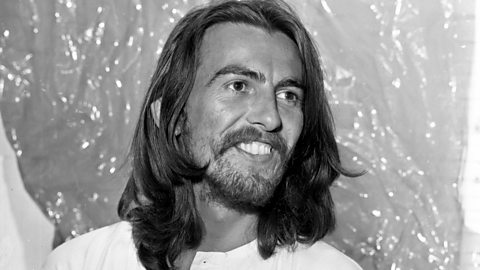
How George Harrison brought a food crisis into the public consciousness
Professor Tim Lang on how the Concert for Bangladesh changed what we know about hunger.
A fear of mass starvation kickstarted a vegan revolution
In 1971, a debate around the future of food raged. A hugely influential book, The Population Bomb, by the American Biologist Paul Ehrlich, argued that if we carried on multiplying and consuming in the same way, civilisation as we knew it wouldn’t make it to the year 2020. He predicted world scale famine and mass starvation.
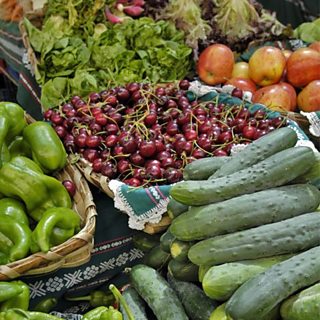
His worst-case scenarios didn’t come true – the green revolution helped food production keep pace with the growing population – but many of his environmental concerns voiced in 1971 still sound relevant today. “Ehrlich was kickstarting an important debate,” says Tim Lang.
And this debate led to the publication of another book that would go on to become a runaway success. Diet for a Small Planet by Frances Moore Lappe argued that hunger could be eliminated from the world if we stopped eating meat and embraced plant-based diets. A new edition is being published this year, as vegan and plant-based alternative foods go from strength to strength.
Was 1971 a year that changed food forever?
Times of turbulence create the greatest change. That was true of 1971, with the politics, economics, innovations and anxieties of the time. Food was certainly transformed.
Fifty years on we’re living through what is arguably an even more tumultuous time and, though we’re yet to discover exactly how, there should be no doubt that 2021 is going to change food irrevocably too.
To learn more, listen to The Food Programme - 1971: A year that changed food forever?
More from Radio 4
-
![]()
The Food Programme
Investigating every aspect of the food we eat
-
![]()
The Kitchen Cabinet
Jay Rayner hosts a culinary panel show packed full of tasty titbits that might change the way we think about food, cooking and eating.
-
![]()
Cook The Perfect...
Jenni Murray and Jane Garvey are joined by leading chefs and food writers who share their secrets for perfect home-cooked dishes.
-
![]()
Farming Today
The latest news about food, farming and the countryside.

